
Publisher:
Bonnie King
CONTACT:
Newsroom@Salem-news.com
Advertising:
Adsales@Salem-news.com

~Truth~
~Justice~
~Peace~
TJP
May-10-2010 07:55


 TweetFollow @OregonNews
TweetFollow @OregonNews
'Ten Days Later' - Kent State... What about Jackson State's Tragedy?
Tim King Salem-News.com"The police fired in excess of 460 rounds of ammunition in less than a minute, leaving over 160 holes in the walls of Alexander Hall." -FBI
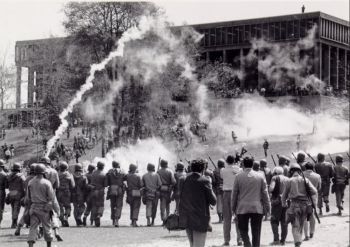 Mississippi police moved the crowd of around 100 to an area in front of a women's on-campus dormitory, Alexander Hall. Here, a hail of gunfire from police that injured 12 and killed two, according to the FBI, saw officers fire in excess of 460 rounds of ammunition in less than a minute, leaving over 160 holes in the walls of Alexander Hall, on the Jackson State campus. |
(SALEM, Ore.) - It's funny, when you Google Kent State and hit the 'Images' button, what you mostly see, are photos of young Americans being shot down by the Ohio National Guard in 1970, for having a voice against the war, and for objecting to the military presence on their otherwise living and breathing campus.
You don't see the sports team, you don't see news images about student accomplishments, or research projects that the university is pleased to laud, mostly just the carnage of the infamous campus shooting on May 4th 1970.
The shooting at Kent State is extremely tragic and worthy of every ounce of ink and moment of air time that the nation's media ever applies to it.
The Beach Boys lyrics to Student Demonstration Time describe it this way:
"The violence spread down south to where Jackson State brothers,
Learned not to say nasty things about southern policeman's mothers
Nothing much was said about it, and really next to nothing done
The pen is mightier than the sword, but no match for a gun"
Now Google Jackson State and hit the 'images' button, what do you see? Football, student pride, knockout cheerleaders, student unity. You have to work to even catch a glimpse of the violence that happened on their campus between May 14th and 15th 1970.
What does it mean? First and foremost, I see the obvious; even when they are war protesters, white students gunned down by domestic military forces just won't be forgotten, the memories will not fade, and they shouldn't fade, ever.
And by that same token, the story of Jackson State should not be obscure, hidden or forgotten. It is good when people move on from tragedy, but what chance would these students have had if this was a paramount issue on campus today?
According to NationMaster.com's online encyclopedia:
"The Jackson State killings occurred on Thursday and Friday May 14th and 15th 1970, at Jackson State College, which is now Jackson State University, located in Jackson, Mississippi.
A group of student protesters were confronted by city and state police. The police opened fire, killing two students and injuring twelve.
Jackson State University was founded in 1877, and it is regarded typically as Jackson State or by the initials JSU. It is a historically black university nicknamed: "Crossroads of the South".
On the days that everything went wrong at Jackson State, a group of approximately one hundred black students gathered on Lynch Street, on the evening of Thursday the 14th. The steet's namesake is John Roy Lynch, the first African American Speaker of the House, Mississippi.
By the time 9:30 p.m. rolled around, the students had started fires and overturned vehicles, including a large truck, according to historical accounts[].
Firefighters responding to the area requested police support, and that was certainly the turning point of the night.
Extreme Overkill
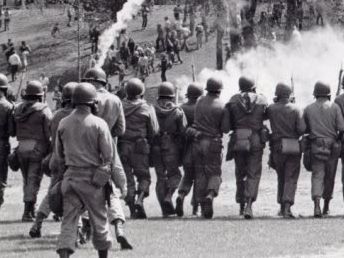
When the police arrived, they did so in force. According to reports, at least 75 units from the city of Jackson and the Mississippi State Police attempted to control the crowd, while the firefighters went about their work.
The fire crews cleared the scene shortly before midnight, and that is when the Mississippi State police moved to disperse the crowd, which had moved to an area in front of a women's on-campus dormitory, Alexander Hall.
From the way it sounds, the students probably knew at this point that they were in danger. Little could they have known though, that it would be even worse than expected.
The police didn't hold back, they didn't leave themselves any challenges, closing to within fifty to a hundred feet of the students, the police opened fire at approximately 12:05 a.m. To this day, the exact cause of the shooting and exactly what happened in the minutes immediately preceding it, is unclear.
Accounts at the time indicated that there was a present danger to police, "the authorities claim they saw a sniper on one of the building's upper floors," one source states. It is highly ambiguous. Perhaps this story will help bring some level of perspective from parties who were there.
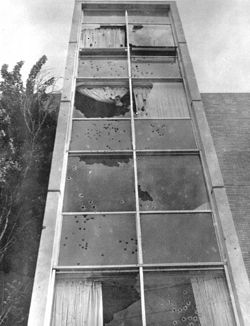
The students said nothing of the sort happened, and that the police simple opened fire for no reason. It seems it was getting popular around this point in time. Freedom of assembly is legal in this country, in spite of what local police say. Permits are not mentioned in the U.S. Constitution, a document that historically is one of the only protections against this type of police behavior.
Besides, how does shooting a crowd of unarmed college students on the ground, affect a sniper on the roof? And people believed this stuff? The law enforcement community in Mississippi was obviously directionally impaired.
But then this is the state where little Emmett Till was tortured and Murdered for daring to speak to a white woman. They said the jury spent more time paused at the coke machine than they did in deliberation. Of course the guilty child killers walked away scott free.
M-I-S-S-I-S-S-I-P-P-I
I could spell the name of this state at the age of five, but, even after spending ten days there enroute to cover the war in Afghanistan in 2006, I still can't understand the mindset. I think they are far more concerned with keeping the loser confederate battle flag flying, than investigating or convicting people for Murder.
After the shooting at Jackson State, the students who were not struck down, scattered. They crashed into each other, people were reportedly trampled as others tried desperately to flee for their lives. Others were cut by broken glass from the college's windows, shattered by police gunfire.
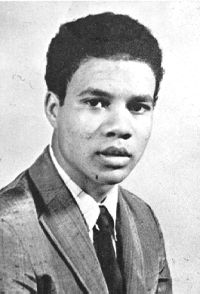 21-year old Phillip Lafayette Gibbs, a |
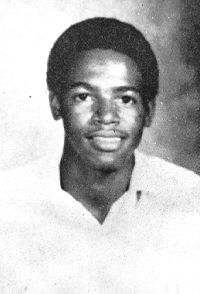 17-year old James Earl Green, a |
The Jackson State University Website states that 21-year old Phillip Lafayette Gibbs, a Jackson State College student, and 17-year old James Earl Green, a Jim Hill High School senior, were killed on May 14, 1970 during a hail of gunfire. "Ten days earlier, at Ohio's Kent State University, National Guardsmen opened fire on a crowd of rioting students, killing four and wounding nine."
During the shooting at Jackson State, twelve more people were wounded. Phillip Gibbs was killed near Alexander Hall, shot by buckshot. James Green was killed behind the police line in front of B. F. Roberts Hall. He was also shot by a shotgun wielding Mississippi lawman.
According to the university, "The police fired in excess of 460 rounds of ammunition (FBI estimate) in less than a minute, leaving over 160 holes in the walls of Alexander Hall. They then took some time to gather their spent shell casing before withdrawing, leaving the scene in the hands of the National Guard."
The shooting was investigated by 'The Presidential Commission on Campus Unrest'. They also held public hearings at Kent State, Los Angeles, and Washington.
No arrests were made in connection with the deaths at Jackson State. The media pays little attention to it, but I am glad to know that the facts are out there, most are now in this article, but the interest in this historic event should grow, and it is sad that the police just had to shoot, that they took it as an opportunity to cut black students down with a ridiculous, reprehensible number of rounds. If it wasn't so sad, the mindset of these "police officers" would simply be something to ridicule, but it is much more serious than that.
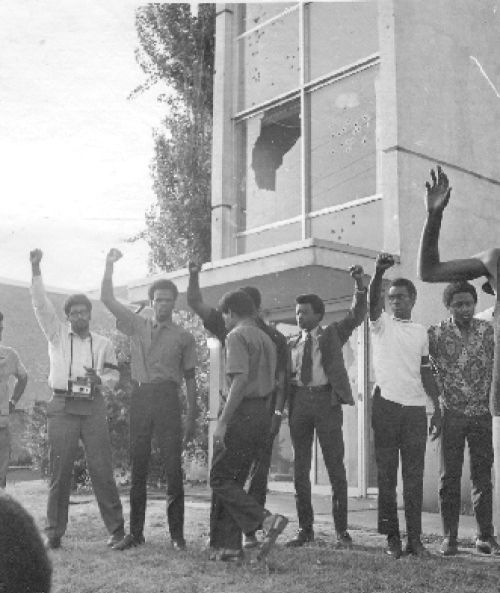
Jackson State writes:
Without a doubt, the spring of 1970 was
a tense and hot season for American college
students. Protests and riots flared up over
the escalation of the war in Vietnam, the
sending of US troops to Cambodia, the
environment, civil rights, and the inclusion
of women into many formerly all-male
universities and colleges. Certainly Kenyon
College was experiencing just such a
difficult transitional period. At Jackson
State University in Jackson, Mississippi,
tensions were particularly high in regards
to racism and civil rights.
Since its establishment as a teacher's
college in the late 1800s, Jackson State
had been subject to racism. The school
moved from its original location because
it was too close to an all-white area, and
established a new campus in an entirely
black neighborhood. Lynch Street, named for
Mississippi's first black congressman,
bisected the new campus and linked west
Jackson, a white suburb, to the downtown area.
In the early 1960s, a Masonic Temple just
down the block from the university on Lynch
Street was the headquarters for the
Mississippi civil rights movement. Despite
the proximity of the headquarters to the
school, JSU students participated little in
demonstrations and protests. A state
school, Jackson could not afford to
alienate the all-white board of education.
At nearby private institution Tougaloo
College, students openly protested and
organized sit ins, and brought a march to
Jackson State after being forced from a
whites-only library. Instead of organized
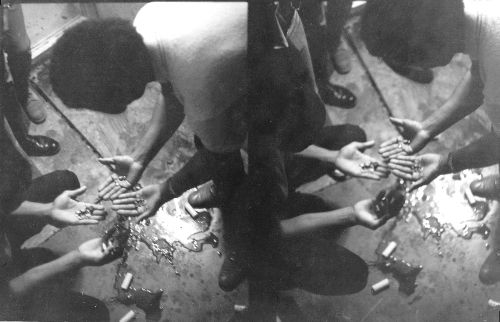 Blood and bullets left in the aftermath of the shooting |
protests, JSU students resorted to throwing
rocks and bottles at white motorists who
shouted racial slurs at them as they drove
from their downtown jobs to their suburban
homes via Lynch Street.
Every spring, a mini-riot occurred at Lynch
Street and the thoroughfare was temporarily
closed, but the city still refused to
permanently reroute traffic despite numerous
pleas from university officials.
In the spring of 1970, a popular female
student was injured by a white motorist
while attempting to cross Lynch Street.
White motorists already angered the student
population by shouting racial slurs and
epithets from their windows while driving
past campus, and students had retaliated by
throwing rocks and bottles. With the already
mentioned national stress factors, and the
death of four Kent State University students
over a week earlier, Jackson State students
had enough to be worried about. Racism and
the struggle for civil rights made their
situation even more unbearable."
The University has memorialized the tragic occurrence by naming the area of the shootings Gibbs-Green Plaza.[1] The Plaza is a large, multi-level brick and concrete patio and mall on the eastern side of the JSU campus that blocks off J. R. Lynch Street and links Alexander Hall to the University Green. A large stone monument in front of Alexander Hall near the plaza also pays tribute to the two victims. Damage to the façade of Alexander Hall caused by rounds fired by the police is still visible.
The Jackson State killings occurred on May 14-15, 1970, at Jackson State College in Jackson, Mississippi. A group of student protesters were confronted by city and state police. The police opened fire, killing two students and injuring twelve. But today Jackson State is little more than a polite footnote to the Kent State shooting that occurred ten days prior.
Of the recent shootings only Kent State has received large national media attention. Due largely in part to John Filo's iconic Pulitzer Prize-winning photograph of Mary Ann Vecchio, a fourteen-year-old runaway, kneeling over the dead body of Jeffrey Miller after he was shot by the Ohio National Guard.
Another page from the University offers chilling details, important background, and ties it all together by discussing the significance of the event, including the mandatory comparison to Kent State, which everyone, remembers, while most say "huh?" over Jackson State the first time you mention it to them. Hopefully this article will change that just a little, I'd be pleased, history like this is too important to forget.
Jackson State Ten Days Later...
Celebrating and remembering the lives of Phillip Gibbs and James Green
Nation Master Encyclopedia - Jackson State killings
 Tim King is a former U.S. Marine with twenty years of experience on the west coast as a television news producer, photojournalist, reporter and assignment editor. In addition to his role as a war correspondent, this Los Angeles native serves as Salem-News.com's Executive News Editor. Tim spent the winter of 2006/07 covering the war in Afghanistan, and he was in Iraq over the summer of 2008, reporting from the war while embedded with both the U.S. Army and the Marines.
Tim King is a former U.S. Marine with twenty years of experience on the west coast as a television news producer, photojournalist, reporter and assignment editor. In addition to his role as a war correspondent, this Los Angeles native serves as Salem-News.com's Executive News Editor. Tim spent the winter of 2006/07 covering the war in Afghanistan, and he was in Iraq over the summer of 2008, reporting from the war while embedded with both the U.S. Army and the Marines.
Tim holds numerous awards for reporting, photography, writing and editing, including the Oregon AP Award for Spot News Photographer of the Year (2004), first place Electronic Media Award in Spot News, Las Vegas, (1998), Oregon AP Cooperation Award (1991); and several others including the 2005 Red Cross Good Neighborhood Award for reporting. Serving the community in very real terms, Salem-News.com is the nation's only truly independent high traffic news Website. You can send Tim an email at this address: newsroom@salem-news.com
Articles for May 9, 2010 | Articles for May 10, 2010 | Articles for May 11, 2010

Salem-News.com:
googlec507860f6901db00.html



Terms of Service | Privacy Policy
All comments and messages are approved by people and self promotional links or unacceptable comments are denied.
Wayward Bill May 10, 2010 12:14 pm (Pacific time)
Thanks Tim for drawing this forgotten American tragedy into the light again.
The students at Jackson State College although black were not different that the students at Kent State University. They were unarmed. They were exercising their first amendment right to free speech and assembly.
Some were innocent and some not so innocent but all the same they should have never been fired upon their own countrymen. You like myself are ex-military and know there were better crowd control methods than using bullets.
Bad decisions were made at both locations and "no accountability" has ever truly been taken in each tragedy. The true catastrophe of both matters.
I am glad to have been the catalysis for this story. Thank you!
Wayward Bill Chengelis
Asst Exec Director
US Marijuana Party of Colorado
Administrator/Spokesperson
US Marijuana Party
Tim King: For the record, it is Bill who drew this to our attention, and while I knew only general information about the event, I would not have been smart or quick enough to think of it in time, so thanks Bill for helping us with this!
gp May 10, 2010 8:47 am (Pacific time)
Those were horrific times yet nothing like today with the carnage that is perpetrated by our government all over the world. We have over 700 military bases (or something like a 1000 according to Chalmers Johnson) spread over the globe and no money for housing and food and education and a medical system for all of our citizens. At the time of Kent State and Jackson State, I was in a nursing program that the government paid for. I received tuition, books, uniforms and a stipend that allowed me to acquire an education that allowed me to support myself and my two children. Priorities are upside down.
[Return to Top]©2025 Salem-News.com. All opinions expressed in this article are those of the author and do not necessarily reflect those of Salem-News.com.